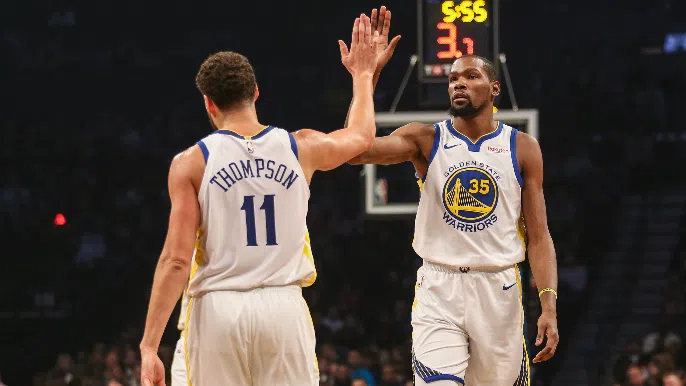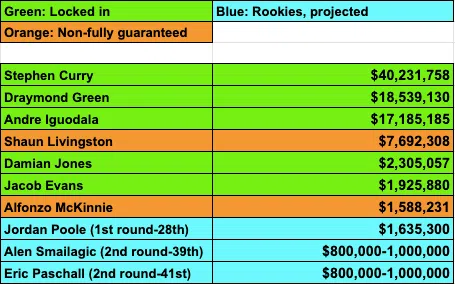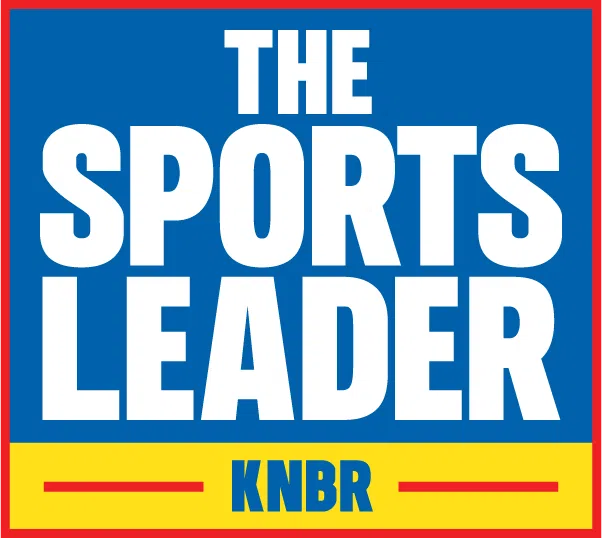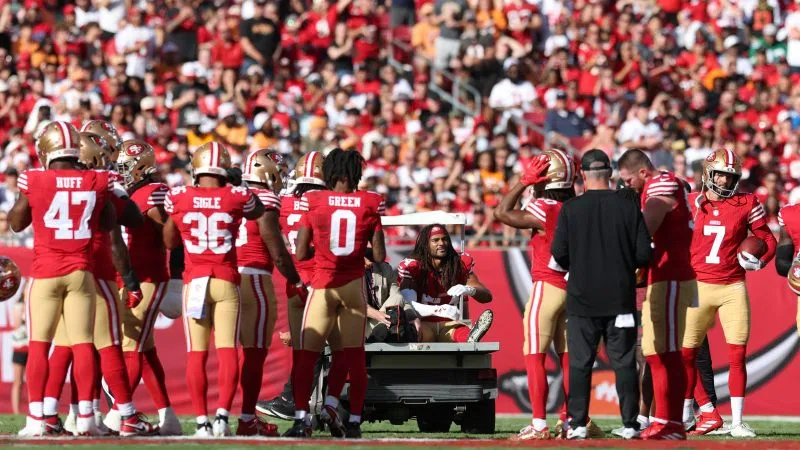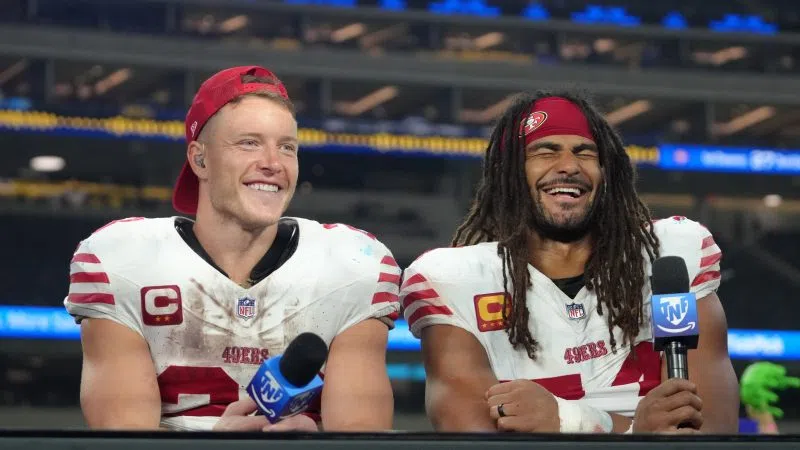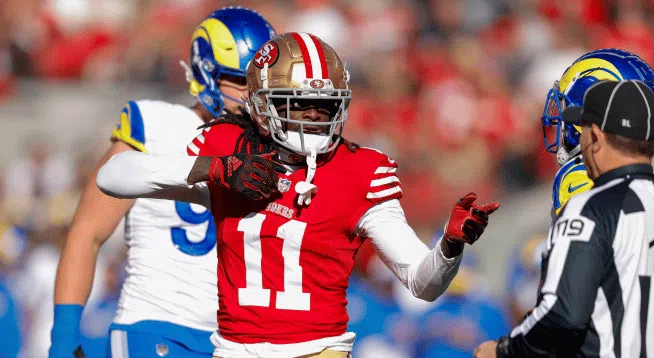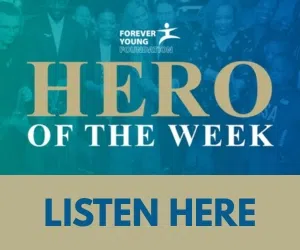© Wendell Cruz-USA TODAY Sports
On June 30th, at 6 p.m. ET, the NBA will be enveloped in complete chaos when the free agency period officially begins. At least, it projects to be that way with the perpetual drama surrounding this summer’s free agency.
The fights over a loaded free agent class featuring the likes of Kevin Durant, Kawhi Leonard, Kyrie Irving, Klay Thompson, Jimmy Butler, Kemba Walker and others has left teams in a frenzy to open up cap space and make their run at a potential franchise-changing player.
The Warriors, of course, have two of those guys on the open market. Below, we examine what the Warriors may plan to do with those two marquee free agents, along with the other seven free agents they have.
Who’s already locked in?
Before breaking down who the team might bring back, you have to know who’s already on the team. Below is a chart that provides a general look at who the Warriors will retain under contract next season next to their 2019-20 salary:
Graphic by Jake Hutchinson, contract data via Spotrac.com
To recap the chart above:
- Stephen Curry is in the third year of a five-year, $201.2 million supermax contract he signed in 2017
- Draymond Green is in the final year of the five-year, $82 million rookie extension he signed in 2015 and will be an unrestricted free agent in 2020
- Andre Iguodala is in the final year of the three-year, $48 million deal he signed in 2017, and will be an unrestricted free agent in 2020
- Shaun Livingston is in the final year of a three-year, $23.7 million deal he signed in 2017, but is only due $2 million guaranteed if the Warriors (likely) waive him by June 30; he’s stated that he is considering retirement, but would (and should) likely wait until the Warriors waive him to retire, unless both sides negotiate a buyout, which is reportedly in the works
- Damian Jones is in the final, fourth year of his rookie contract, after the Warriors opted to pick up his fourth-year option earlier in the season; he’ll become a restricted free agent in 2020 if the Warriors tender him a qualifying offer
- Jacob Evans is in the second year of his rookie deal; the Warriors will have the chance to pick up his third- and fourth-year options
- Alfonzo McKinnie is in the second and final year of a two-year, non-fully guaranteed contract. The Warriors are nearly certain to retain him on the very cheap deal, and they’ll have him as a restricted free agent in 2020, with the option to tender him a $2.02 million qualifying offer
- Jordan Poole will receive between 120 percent and 80 percent of the $1.635 million that the first-round rookie scale ensures he receives as the 28th overall pick; that amount will rise by incrementally each year until the fourth year option which is 80.5 percent greater than the third-year option, a tick above $3 million
- Alen Smailagic and Eric Paschall were drafted in the second round, leaving their contract statuses unclear. See more on them at the bottom of this piece.
Upcoming Free Agents
Kevin Durant
- Free agent status: Unrestricted
- Previous salary: $30 million
- Projected contract: Five-year max, $221 million (with Warriors) OR Four-year max, $164.6 million (elsewhere, New York Knicks/Brooklyn Nets)
- Warriors’ rights to re-sign: Full Bird rights, can exceed cap to pay him full supermax
- Prediction: Departs for either New York Knicks or Brooklyn Nets
At this point, you’ve probably read all about Kevin Durant’s free agency and are understandably tired of hearing the rumors. The New York Times’ Marc Stein said on The Bill Simmons Podcast Monday that while Durant’s three destinations (Warriors, Knicks, Nets) are all evident, no one outside of Durant’s camp knows where he’s heading.
That is to say this prediction is a complete guess. He could well return to the Warriors, which would make sense from a monetary standpoint coming off an Achilles tear, arguably the most devastating injury an NBA player can suffer. But if Durant’s intentions were always to go to New York as was projected earlier in the season – the consternation over which eventually led to the bust-up between him and Draymond Green – and those deals are still on the table, it seems hard to imagine he wouldn’t still take them.
Sure, maybe he has a sour taste in his mouth from the way that his season (and potentially Golden State career) ended in the Finals, but it seems hard to believe that he’d hold ill will against the team after his own doctors looked at the injury and he saw constant reevaluation over the four-plus week span he was out. Andre Iguodala said Tuesday on KNBR 680 that no one pressured Durant to play and it was made clear the calf injury couldn’t become an Achilles injury.
“I don’t think that Kevin was pressured to play; not from his teammates, not from coaching staff, not from training staff and definitely not from ownership,” Iguodala said. “And I didn’t think one had to do with the other. Now, we can go and fight that all day long, but we had so many eyes on that, and all agreed that the calf [injury] would not turn into an Achilles injury.”
Both what Iguodala said and the report from Bleacher Report’s Ric Bucher through another team’s executive that, “he’s really pissed off at the Warriors,” could simultaneously be true. Maybe Durant is “pissed” at the Warriors even if he knew the risks, and there’s an element of trust lost that is unsalvageable.
But it feels more likely that Durant would prefer a change of scenery on the basis of opportunity rather than spite; a chance to give a young team in the Knicks or Nets with assets another year to build and mature, before using their remaining cap space to make a playoff push once Durant returns the following season.
It gives him a chance to become a legend for franchises that haven’t held titles since the 1970s (the Nets in the ABA in 1974 and 1976, the Knicks in the NBA in 1973 and 1970) and establish himself as a paragon of what a modern NBA superstar can be by wielding his own free agency power yet again.
Klay Thompson
- Free agent status: Unrestricted
- Previous salary: $18.99 million
- Projected contract: Five-year max, $190 million (with Warriors) OR Four-year max, $141 million (elsewhere, Los Angeles Clippers)
- Warriors’ rights to re-sign: Full Bird rights, can exceed cap to pay him full max
- Prediction: Stays on full, five-year max
Unless the Warriors lowball Klay Thompson, which seems a near-impossible scenario – especially considering the fact that the team avoided possibly paying him an additional $30 million with the supermax a few months back when he was kept off all three All-NBA teams – Thompson will be back with the Warriors for the next five years, and may make it back for the playoffs, depending on how his rehab goes.
There was a report by Adrian Wojnarowski that Thompson would consider the Los Angeles Clippers if the Warriors didn’t offer him the max – which seems largely a play by his agent to ensure the Warriors give him the money he deserves – but that assumes the Warriors won’t make that offer. They will, and Thompson will remain a Warrior and potentially retire one as he has stated is his intention.
DeMarcus Cousins
- Free agent status: Unrestricted
- Previous salary: $5.34 million
- Projected contract: Unclear, considering injury woes and reported short-term interest from Knicks, could receive something like a one-year, $10-20 million offer, or a mid-term $8-12 million for two or three years. Very unclear, perhaps most unpredictable of any free agent on the market.
- Warriors’ rights to re-sign: Non-Bird, signed with mid-level; the maximum the Warriors can offer is $6.4 million a year if over the cap, can offer up to full $9.2 million non-taxpaying mid-level exception for up to four years if Durant walks
- Prediction: Departs on short-term, high-paying deal, potentially to Knicks if Durant does not sign there
There’s probably little chance the Warriors bring Cousins back. He was much better than expected coming off an Achilles injury, although was grilled for his inconsistencies and sometimes erratic performances. When he picked up the ball and started driving to the lane, there seemed to be a 50/50 chance he would commit a turnover. Again, he’s a 7-foot, 300-pound center coming off the most devastating injury possible for a basketball player, which often takes two years for a full recovery.
While he suffered from inconsistency, there were moments of pure brilliance from Cousins, and he had two outstanding Finals games after an improbable recovery from a quad tear in the playoffs. He finished with 16.3 points (48 percent from field, 27.3 percent from 3-pt, 73.6 percent from line), 8.2 rebounds, 3.6 assists, 1.5 blocks, 1.3 steals, and 2.4 turnovers per game this season, which, in year one of an Achilles recovery, for a player his size in a new offense, is impressive.
Still, his health is a question mark, especially after that quad tear, and teams may be weary of paying him a hefty multi-year contract. According to Marc Stein, if the Knicks do not sign Durant, they will be suitors for Cousins on a one-year deal. If that happens, and with teams required to use 90 percent of their salary cap space on players, expect something like a one-year, $20 million deal for him so he can prove his value and look for a long-term deal in 2020.
The Knicks are weighing the prospect of extending a considerable one-year offer to Warriors free-agent big man DeMarcus Cousins if they miss out on top target Kevin Durant, league sources say
— Marc Stein (@TheSteinLine) June 27, 2019
His value is hard to predict, but it’s within reason to see a team who strikes out on a top-tier free agent paying him upwards of $10 million a year on a panic, multi-year deal, or something like the Knicks’ potential J.J. Redick-like high-paying, one-year deal. Regardless, he’s likely not back in the Bay, unless Durant leaves and the Warriors offer him the full, non-taxpaying mid-level exception at $9.2 million for multiple years. Considering the money other teams have out there and the Warriors’ need for shooting, this seems unlikely, but the most viable route for him to stay.
Kevon Looney
- Free agent status: Restricted
- Previous salary: $1.57 million
- Projected contract: Upwards of $5 million annually, between $5-12 million for at least three years
- Warriors’ rights to re-sign: Full Bird rights, can exceed salary cap to sign him to up to a five-year deal for however much, have option to match any offers
- Prediction: Stays on a roughly $5-10 million deal per year (depending on what he’s offered elsewhere) for 3-4 years
Looney could be a tricky one for the Warriors to keep, depending on what offers he gets in free agency. Of course, the team can match any offer for him, but with a pretty poor front court free agent class, Looney could potentially receive an offer the Warriors wouldn’t be willing to match considering the tax ramifications if they re-sign Durant and Thompson.
If only Thompson re-signs, it seems more likely than not that Looney would return, as a key, young piece of the Warriors’ core, although Looney will have no shortage of suitors, many of whom are likely to be playoff contenders.
Not only has Looney’s defense improved, especially in defending perimeter players, but his offense has massively improved as well. The problem is that he showed all that in the playoffs, and especially the Finals while playing well despite a fractured collarbone. That’s the type of performance to get a player paid.
While his per-game stats were unimpressive (6.2 points, 5.2 rebounds, 1.5 assists, 0.7 blocks, 0.6 steals), his impact was unmistakable on the court, and his per-36 minutes stats of 12.2 points, 10.1 rebounds, 3.0 assists, 1.3 blocks, 1.1 steals per game were much more indicative of his value, especially as his minutes increased in crucial games down the stretch.
Despite the tax ramifications, it seems likely the Warriors will do what they can to bring Looney back. If Durant goes, there’s little chance Looney leaves. Expect him to get at least a three-to-four-year deal worth at least $5 million a year, and probably much more; something in the range of four years, $30 million seems viable.
Quinn Cook
- Free agent status: Restricted
- Previous salary: $1.54 million
- Projected contract: Two-to-three years, $3-5 million per year
- Warriors’ rights to re-sign: Early Bird rights, can exceed salary cap to sign him to up to a four-year deal for up to NBA average salary multiplied by 105 percent, have option to match any offers up to that limit
- Prediction: Leaves with Durant to Knicks or Nets
Cook seems the hardest to predict aside from Durant, largely because he and Durant are so close. Both have been friends since childhood, with Cook embracing a little brother-type role in their friendship. With Durant set to spend at least a full year recovering from a devastating Achilles tear, it seems likely he’d want his closest friend in the NBA with him for the journey.
There have been reports that the two could be a package deal, where if you sign Durant, you also have to sign Cook, but it’s unclear whether that holds true. The Warriors will obviously have interest in bringing Cook back as a backup ball-handler and shooter (40.5 percent from 3-pt last season) to Curry, but it all depends at what cost he’s worth to them.
Cook can be offered up to the NBA average salary multiplied by 105 percent, which was $6,388,007 last season, meaning the Warriors could offer up to $6,707,407 for two-to-four years. They’ll likely tender a $1.9 million offer to Cook to make him a restricted free agent, and there’s probably no team that offers Cook more than the NBA average, although there could be a dollar number or number of years the Warriors don’t feel comfortable matching. If he gets a three-year, $12 million offer from whatever team signs Durant, would the Warriors match it? There’s no clear answer as of yet.
If Durant stays, it’s likely Cook will too, but if Durant leaves, don’t be surprised to see Cook leaving with him.
Jordan Bell
- Free agent status: Restricted
- Previous salary: $1.38 million
- Projected contract: Minimum at $1.8 million qualifying offer, or another team at two-to-three years, $2-3 million per year
- Warriors’ rights to re-sign: Early Bird rights, can exceed salary cap to sign him to up to a four-year deal for up to NBA average salary multiplied by 105 percent, have option to match any offers up to that limit
- Prediction: Stays, but leaves if offered a contract above the minimum elsewhere, as Warriors refuse to match
Bell has been an enigmatic character over the last two years, and too often, his flashes of brilliance have been undermined by moments of disappointment and boneheadedness, whether on the court or off (when he jokingly charged a $15 candle to assistant coach Mike Brown, and the Warriors had reason to believe it wasn’t the first time, suspending him for a game).
He’s in essentially the same contract position as Cook, and could be offered up to $6,707,407.35 per year (see Cook portion above) for two-to-four years. That’s out of the question. After the suspension and his underwhelming performances and statistical regression last season, the Warriors are probably going to let Bell walk if any team offers him more than the $1.8 million qualifying offer they’re expected to tender. He could likely leave for a young or competitive team looking for youthful front court depth on a two-year, semi- or fully-guaranteed deal for around $2-3 million per year.
Jonas Jerebko
- Free agent status: Unrestricted
- Previous salary: $2.18 million
- Projected contract: Veteran minimum or slightly above on short-term deal
- Warriors’ rights to re-sign: Non-Bird
- Prediction: Leaves, eligible for $2,611,512 veteran minimum or $2,934,102; at age 32, may receive something like a two-year, $6 million offer.
Jerebko could be back with the Warriors if he takes a veteran minimum contract. The workaround with veteran minimums is that while players are paid higher than a standard minimum contract for players with less than three years of service, teams are compensated for the difference when signing veterans. Therefore, the Warriors would only be paying the standard $1.62 million minimum for 2019-20 to Jerebko, and being compensated for the roughly $1.1 million difference of the full $2,611,512 amount.
Despite his $2.18 million salary last season, his cap hit was only last year’s $1.51 million minimum. With the Warriors’ non-Bird rights, they could also offer up to 120 percent of next year’s veteran minimum, which would top out at $2.93 million.
Yet, if Jerebko signs for above the minimum, that cap relief goes away. So, if the Warriors can bring Jerebko back on another one-year veteran minimum deal, there’s a chance he returns. He provided solid spacing and a big that the Warriors could go to on the wing, although his athleticism left a lot to be desired. But, if he can make more than that minimum, or get even a two-year deal, it’s hard to see him returning, especially with younger players like Eric Paschall waiting for their chance. Even if he only gets a veteran minimum deal, the Warriors might want to look to take a chance on youth, with a different type of season ahead.
Andrew Bogut, unrestricted
- Free agent status: Unrestricted
- Previous salary: $486,892
- Projected contract: Has contract in NBL
- Warriors’ rights to re-sign: Can offer up to 120 percent of previous contract, veteran minimum like Jerebko
- Prediction: Returns to National Basketball League in Australia
Bogut’s not coming back, as he has another year left on his deal with the Sydney Kings in Australia, but it was nice to see him again, wasn’t it? He did say that if the Warriors want to bring him back for another playoff run, however, he’d be open to it.
Damion Lee
- Free agent status: Two-way restricted
- Previous salary: Two-way, unclear – between roughly $200,000 and maximum of $506,215
- Projected contract: Minimum for two years
- Warriors’ rights to re-sign: Two-way restricted free agent
- Prediction: Returns on two-year deal similar to Quinn Cook’s previous deal, but from start of 2019-20 season
Damion Lee was a casualty of numbers for the Warriors and could have potentially helped the team in the Finals when they were desperate for someone who could score. Lee, the brother-in-law of Curry, averaged 20.3 points per game in the G League while shooting 39.8 percent from deep. In the NBA, Lee averaged 4.9 points over 11.7 minutes per game while making 39.7 percent of his 3-pointers, and provided some much-needed bench scoring in spurts.
The Warriors did not have any sort of consistent bench scoring, but Lee showed he was capable of bringing it. It seems likely the Warriors hold onto him, and potentially give him a semi- or fully-guaranteed deal at the minimum like they gave to Quinn Cook a couple seasons ago at the end of the 2017-18 season through 2018-19. In Lee’s case it would be at least semi-guaranteed for two years at the start of the 2019-20 campaign.
They could also offer him another two-way contract, but he seems like he’s proven enough to at least get a minimum contract somewhere else if the Warriors don’t offer him one, and the organization likely knows that.
Marcus Derrickson
- Free agent status: Two-way restricted
- Previous salary: Two-way, unclear, less than Lee – between roughly $100,000 and maximum of $506,215
- Projected contract: Minimum or two-way
- Warriors’ rights to re-sign: Two-way restricted free agent
- Prediction: Departs or receives another two-way
Derrickson didn’t get much attention last season, but was solid in the abbreviated moments that he showed. He was reliable in the G-League, and spaced the floor with a Draymond Green-like frame (13.7 points per game on 46.7 percent shooting, 42.1 percent from 3-pt, 84.1 percent from FT, 5.6 rebounds per game).
It wouldn’t be surprising at all to see the Warriors give him another two-way deal, but it’s hard to imagine him grabbing one of the team’s guaranteed roster spots unless he shows out in training camp. It’s not out of the question, but with the Warriors drafting three new rookies and at least one injured roster spot taken up by Thompson, they may want a more proven player to fill out the back end of the roster.
Smailagic and Paschall’s contracts
Second-round picks do not deal with the same scale that first-round picks utilize, meaning that projecting the type of deals they receive is near impossible. If the Warriors had kept their 58th pick, there is a strong possibility whoever they had drafted would be signed to a two-way or G-League contract as opposed to a multi-year, at least semi-guaranteed contract.
There is a chance Smailagic (39th overall) or Paschall (41st overall) could sign a G-League contract; the highest draft pick signed to such a contract in the 2018 NBA Draft class was Justin Jackson of the Orlando Magic, who was drafted 43rd overall. Aside from Jackson and Issuf Sanon, the Wizards’ 44th overall pick who elected to play overseas, every second-round draft pick selected 50th or above received a multi-year contract that was at least semi- or fully-guaranteed.
The later stages of the draft featured less predictability, and plenty of two-way deals:
- Tony Carr, New Orleans Pelicans’ 51st overall pick, elected to play overseas
- Vince Edwards, Houston Rockets’ 52nd overall pick, received one-year, non-guaranteed $838K deal; only one-year, non G-League or two-way deal
- Devon Hall, Oklahoma City Thunder’s 53rd overall pick, elected to play overseas
- Shake Milton, Philadelphia 76ers’ 54th overall pick, signed two-year, two-way contract
- Arnoldas Kulbocka, Charlotte Hornets’ 55th overall pick, elected to play overseas
- Picks 57-60, all G-League or two-way contracts
Yet, Paschall was projected as a late first-round pick and projects to play now, so it seems likely he’ll get a semi- or fully-guaranteed deal for between two and four years (potentially with team options) with a salary between $800,000 and $1 million to start (as has been the general range for high second-rounders).
Because the Warriors drafted Smailagic so high, it seems hard to believe they wouldn’t also sign him to a semi- or fully-guaranteed, long-term deal, especially since he’s viewed as a prospect. The perception appears to be that the Warriors intend to stash Smailagic in the G-League, which would be viable for the next two years.
Any player with less than three years of service to their NBA G-League affiliates (Smailagic has one) can be assigned to the G-League an unlimited number of times. Essentially, if the Warriors want to, Smailagic could stay in the G-League for the next two full seasons, but he probably wouldn’t agree to that without some sort of long-term guarantee.
The Warriors moved up high in the second round and traded a total of three picks (two in the trade for the 39th overall, one for the 41st overall) to get him, so it seems unlikely they’d only sign him to a two-way, G-League or short-term contract. His per-year money will probably be similar to Paschall’s.
The issue with stashing Smailagic on a guaranteed deal is that the team would essentially be conceding a roster spot in a way they wouldn’t have to with a two-way contract. Considering the possibility of two unusable roster spots being taken up by the injured Kevin Durant and Klay Thompson, this approach could leave the Warriors severely shorthanded this season.
